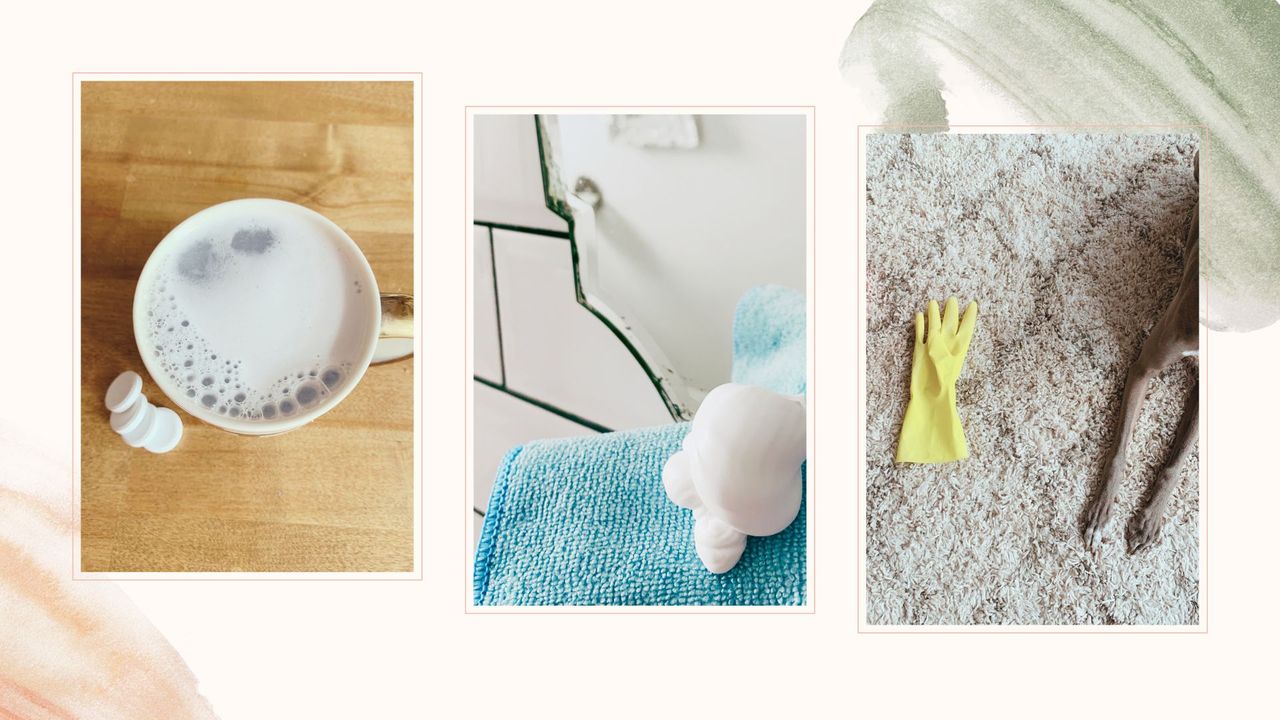
The internet is full of cleaning hacks and viral tricks to help with weekly chores. However, keeping our homes tidy demands enough effort without trying out new techniques and strange cleaning combinations.
So, to help you save both time and effort on your daily cleaning routines and deep cleans, we've compiled a list of the best viral cleaning hacks straight from the professionals that the Woman&home team has tried and tested.
Whether you're cleaning your carpet or giving the kitchen a deep clean, we've got you covered. Here's our round-up of the tried and tested cleaning hacks to help you tackle your household chores big and small.
17 viral cleaning hacks that actually work
From cleaning with vinegar to utilising the best essential oils to deodorise around the home, we've found a cleaning hack to take on any household chore with an alternative approach.
1. Cleaning heavily stained mugs using denture tablets
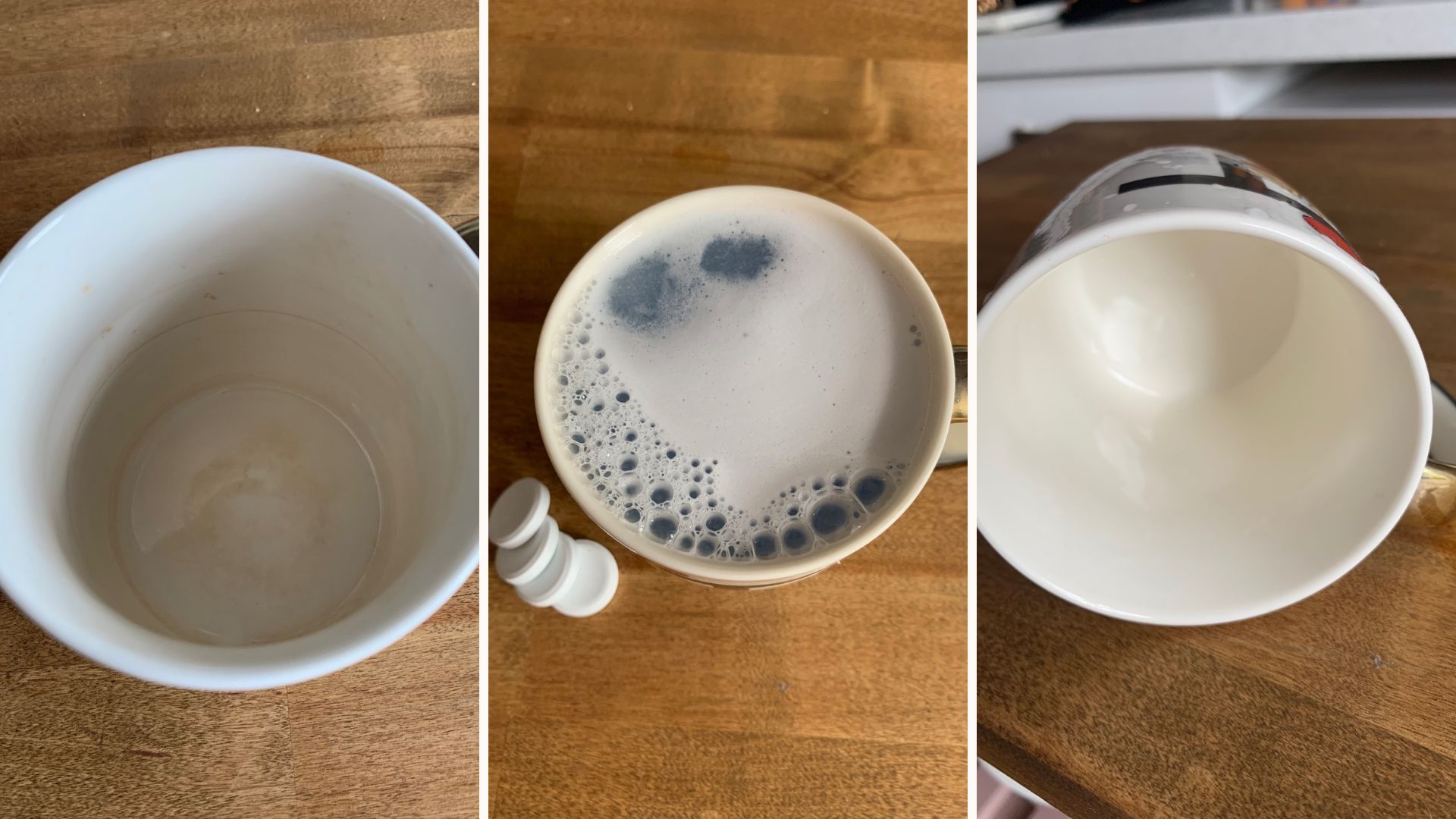
Sick of scrubbing away at your mugs in hopes they’ll no longer expose your coffee addiction? Well, we’ve found a hack for the stubborn stains via TikTok that may save you some elbow grease.
This is recommended by the grandparents of one of the w&h team members, so it's not a new hack by any means. Pop a denture tablet into your stained mug, then simply add some hot water to the top and watch the tablet fizz into action. There's no need to even scrub; after 20-30 minutes, the staining will be lifted away to leave a cup that looks as good as new.
Once you've poured the solution away, rinse and wash your mugs like normal to reveal a transformed coffee-free mug. The table acts as a cleanser and lifts any stains that sponges or dishwashers haven't managed to budge.
Denture tablets are a pretty underrated cleaning tool. There are a few spots around your home that they can make quick work of.
RRP: 99p | While you can get the own-brand versions for even cheaper at Asda, these will certainly offer a little more cleaning power and all for 99p.
2. Rubbing aluminum foil to remove rust
Turns out aluminium foil can do more than merely aid with cooking and preserving food; it's a great cleaning hack for beating rust. "I honestly couldn't believe how effective this simple hack was," says w&h contributor Claire Douglas.
"We had quite an accumulation of rust on our chrome heated towel rail and I was worried that it was beyond help. Thankfully, some scrunched-up aluminium foil saved the day and removed every trace of rust after a few minutes of rubbing it over the surface by hand. I've since read that dipping the scrunched foil in water makes the process even quicker, so I will try that next time."
"Initially, I planned to use a Brillo pad, but I was worried about scratching the chrome surface. Happily, as aluminium is softer than chrome, it doesn't scratch, making the removal process stress-free.
"I found the process very satisfying to complete and couldn't believe how shiny and smooth the towel rail looked afterwards, like new," Claire explains. "I'd advise testing the process on a less prominent patch first, just to be sure that your surface is definitely chrome."
3. Removing pet hair from soft furnishings
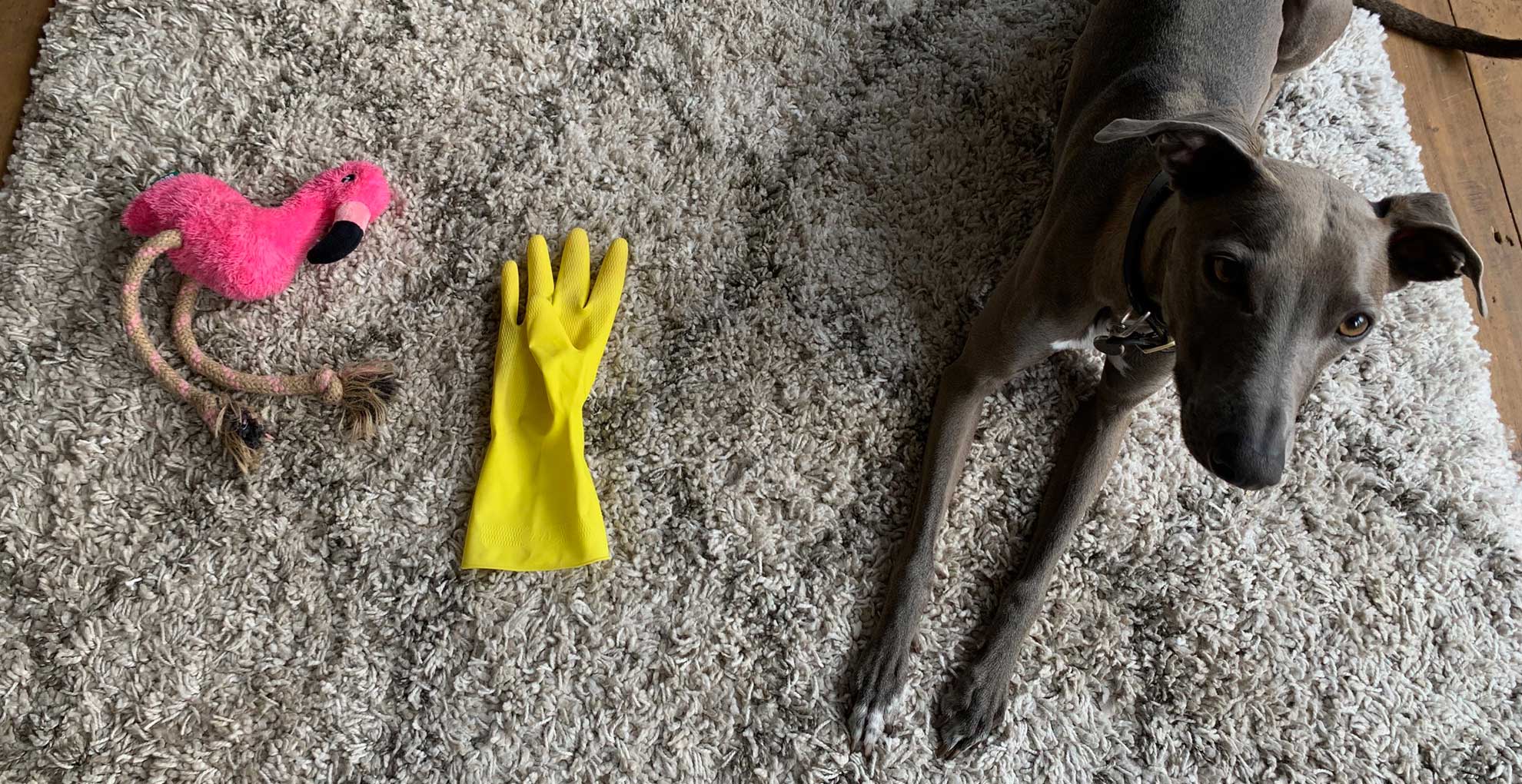
If your home is filled with pets or long-haired loved ones, then you may be getting sick of loose hairs covering every surface. Usually, one of the best vacuums will do the trick but it’s hard to get all the hair lifted. Luckily, this hack deals with stray hairs with ease
"Put on a pair of rubber gloves, the dishwashing kind will do", say the experts at Well Polished Cleaning Services on behalf of Kingsmead Carpets. "Rub your gloved hands over the carpet, applying a bit of pressure as you go. The rubber material creates some magical static electricity that attracts the hair like crazy."
You'll see the hair start to cling to the gloves, making it super easy to gather it all up, ready to throw it away.
"I had to try this one because it seemed so simple, and it really is," says w&h's lifestyle editor Tamara Kelly. "It works a treat on carpets, sofas, pet beds, and more. "My advice would be to wipe the glove free from hair in between wipes on the surface because otherwise, you can transfer it back onto the fabric. I found this most useful for smaller areas like sofas, armchairs, and rugs rather than entire carpets."
RRP: £1.99 | This pack of two rubber gloves comes in a size medium and is perfect for protecting your hands when tackling deep cleans with lots of products.
4. Cotton balls soaked in essential oil to tackle smelly trash cans
This trick is a new trend circulating on the cleaning side of TikTok. Garbage is not a welcoming scent. Sometimes it’s that bad you can smell it through the house, even when it’s meant to be tightly contained within your trash can. You might already remedy this by using scented trash bags, but here’s a way to take that one step further.
Sue Caldwell, managing director of the multi-award-winning, eco-friendly cleaning brand Clean Living International, says: "A great eco-friendly solution is to soak a cotton wool ball in your favourite essential oil and place it in the bottom of bins to provide a beautiful fragrance.”
Simply cover a cotton ball in your favourite essential oil, just make sure if you have pets that the brand or scent isn’t harmful to them first. Then place the balls, we think two is enough, at the bottom of your can underneath the bag. That way, every time you open or remove your bags, there'll be nicer smells coming out than mouldy food – one small step to make your house smell good.
It’s always a good idea to keep your cans clean, too, although it’s not the most welcoming task; a quick wipe down between bag changes can keep the odours away. It'll make all the difference when it comes to keeping the bins smelling fresh through summer, too. y.
5. Lemon and salt to clean wooden cutting boards
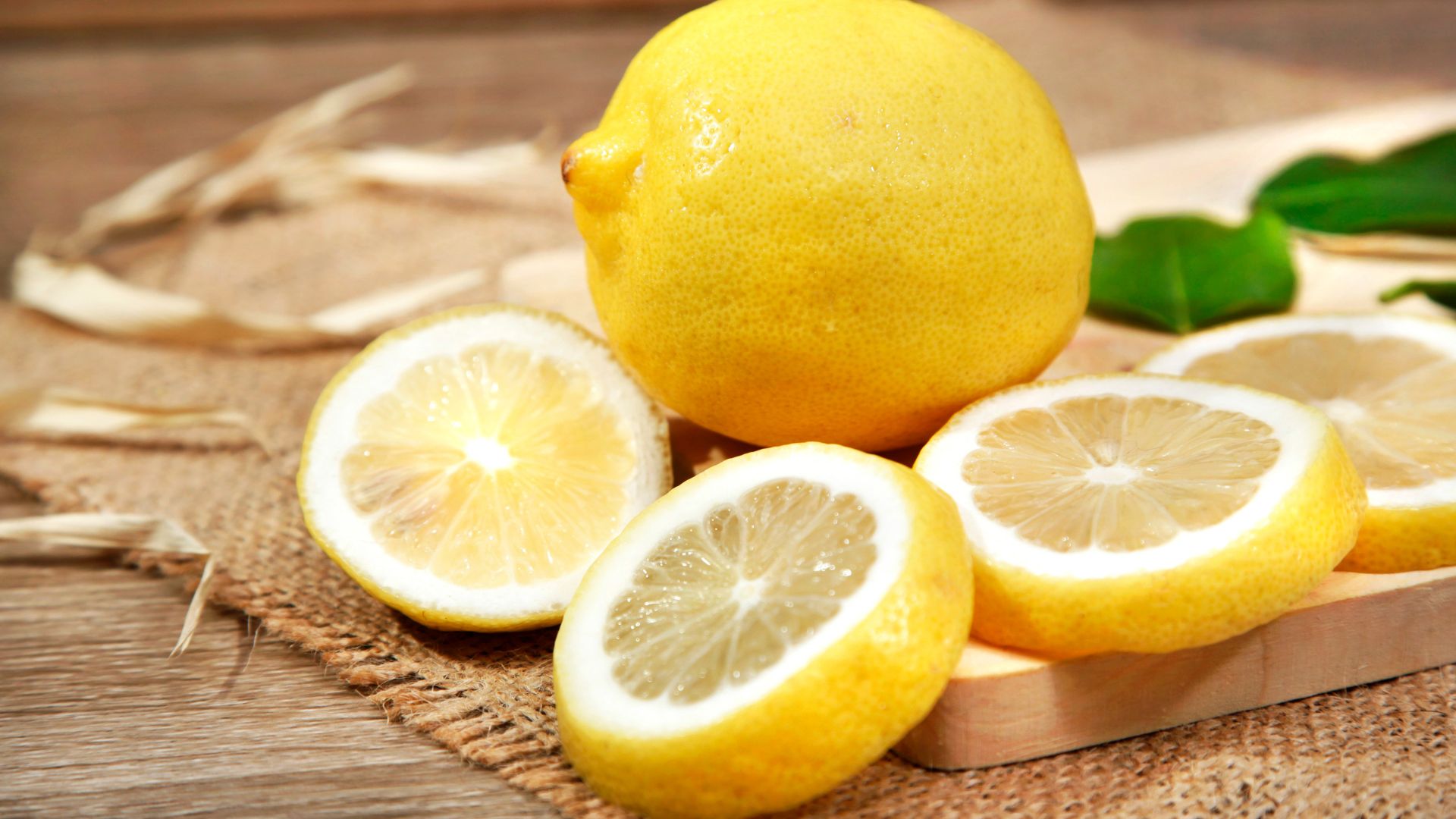
We’ve all been there, chopping away and suddenly realising that the red peppers or marinated chicken we’re cutting is starting to stain our wooden boards. Of course, you can clean your wooden chopping board with a quick scrub with some dish soap, but due to the wood grain, some stains and bacteria stick around.
Lynsey Crombie (aka @lynsey_queenofclean), a cleaning entrepreneur and published author, has a hack that makes use of the magic cleaning qualities of lemons and salt. After clearing and rinsing your cutting board, she suggests taking half a lemon with salt to scrub your board.
She says, “It will naturally disinfect and remove ground-in debris and dirt.” The lemon acts as a deodorising cleaning agent, and the salt has gentle abrasive and disinfecting qualities, great for lifting up stains as well as removing any nasty bacteria. Lynsey also suggests to then use some coconut oil on the board with a cloth, which will not only shine but also protect the wood – also handy when cleaning wooden spoons.
6. Dampening a cloth for dusting success
Any viral 'cleanfluencer' worth their salt will know the effectiveness of dampening a cloth for better results when trying to get rid of dust.
"The most important facet of dusting is having a damp cloth over a dry one. A dry one just disperses dust particles into the air, whereas a damp cloth collects all the dust with ease," explains Ivan Ivanov from End of Tenancy Cleaning.
It's important not to soak the cloth, just ensure it's slightly damp to the touch so it reduces the friction and catches the dust rather than causing it to disperse.
RRP: £4.59 | This is a hero product every cleaner should have in their home. This eight-pack will make any clean-up job that much easier, and having more than one on hand will have you prepared for even the biggest messes.
7. Removing calcium from shower doors using vinegar
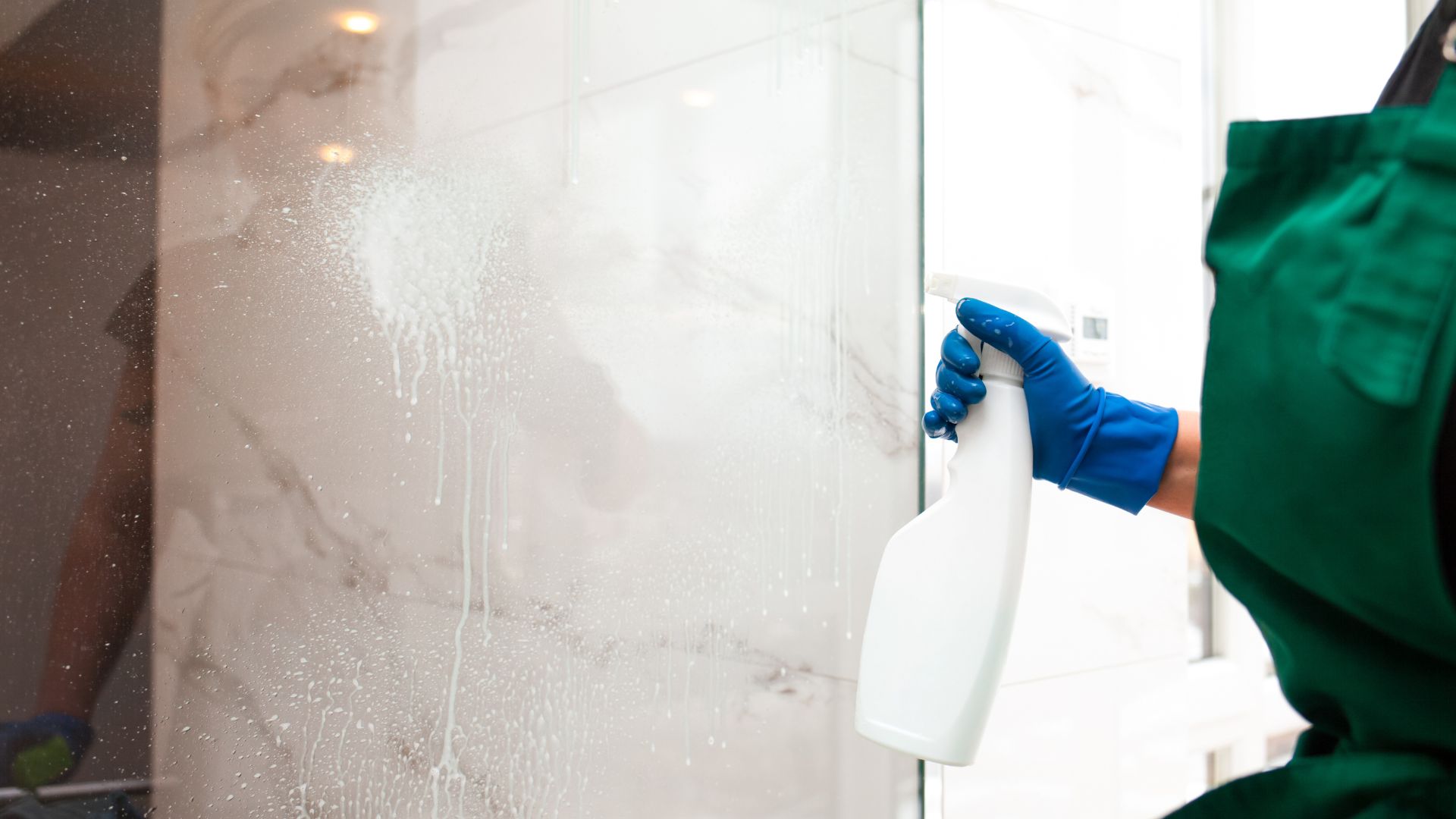
There's no denying that white vinegar is a cleaning superhero when it comes to most tasks in our homes. Its versatility knows no bounds. "I'm completely converted to using white vinegar for cleaning a shower after trying this hack," says Tamara.
Ryan Knoll, owner of Arizona-based cleaning company Tidy Casa, cannot recommend the product enough, with all his employees using it to tackle calcium stains on shower glass doors. He says, "As much as we'd like them to, showers don't wash themselves. With most homes in Arizona where we clean, hard water leads to a lot of calcium buildup."
Our tried and tested technique starts with "Soaking some paper towels in the vinegar and adhering them to the glass door like big stickers," explains Ryan "Allowing them to sit for 20–30 mins, the vinegar will then begin to break down the calcium."
Once 30 minutes have passed, remove the paper towels and take a damp cloth to remove all traces of the vinegar. You can then buff the glass with a microfibre cloth.
RRP: £8.25 | White vinegar is something of a saviour when it comes to chemical-free household cleaning, and this 5-litre bottle is perfect for keeping to hand.
8. Cleaning drains with dishwasher tablets
No matter how much you avoid pouring forbidden liquids down your kitchen sink, there is always the danger that the drains may start to smell unpleasant if left. It's therefore important to master the most effective way to clean your kitchen sink.
“To clean drains, put a dishwasher tablet over the top of the plug and run boiling water so it dissolves," suggests Ivan. "This should unblock some of the grime and leave it smelling fresh. If it doesn’t work for your situation, try using a store-bought drain unblocker to get rid of any excess grime.”
"I've been doing this hack since Ivan shared it with us and it works a treat for preventing unpleasant smells from uncleaned drains," Tamara explains. "It's a far more eco-friendly solution to try before resorting to pouring far more toxic chemicals down the sink to tackle the problem."
9. Descaling a shower head using white vinegar

You may have heard of this one. It’s a very popular hack and there’s a big reason why – It works. "I won't use anything else now to descale and clean my shower head because the results are so impressive," says Tamara.
To try this, simply fill a Ziploc bag with white vinegar; around a cup will do. Then remove your shower head from its holder and submerge it in the bag with the vinegar. (You can do this in the sink if your shower head is detachable). Tie an elastic band around the bag and the elongated part of the shower head to make sure it stays tight and in place. Leave it like that for around 30 minutes.
Once that time has passed, remove the shower head from the bag and use an old toothbrush to gently scrub away any leftover limescale. Finally, run your shower and allow all the vinegar and limescale to wash off, making sure to rinse the head and put it back up. The white vinegar is great at breaking down the hard water residue that commonly blocks the openings in your shower head. You should notice an immediate difference!
Toby Schulz, CEO of Australia’s leading house cleaning service Maid2Match, has worked as a professional cleaner for several years and loves using white vinegar. He says, "White vinegar is a cleaning powerhouse. Try to get the 6% vinegar, which has a higher concentration of acetic acid that helps with breaking down dirt and grime."
10. Removing stains with salt
Spills are inevitable, whether it's coffee stains, wine, or pasta sauce; there's no avoiding them! But what's a quick and simple way of tackling spill stains before they set into your fabrics? Toby recommends salt.
He says, "Salt is a drying agent, so it’s very handy for tackling stains from liquids like red wine, blood, coffee, and even oil. The salt absorbs moisture and oils from most surfaces, while its abrasive nature also works if you use it as a scrub. However, it’s not as effective for dye-based stains or dried stains, and it could damage more delicate fabrics."
Toby does, however, stress the importance of time; he suggests acting quickly when using salt to remove a stain. He says, "For clothing and items like table runners, you can dissolve salt in hot water and soak the fabric for a few hours to 'leech' out the stain. Thoroughly rinse the fabric afterwards to remove any residue, then launder as normal."
This hack is especially useful as salt is something most, if not all of us, have close to hand, especially when eating.
When it comes to stained upholstery or carpets, whether cleaning a carpet stain or a spill on the couch, Toby recommends sprinkling a healthy amount of salt, kosher if you have it, on the affected area and leaving it for around 10 minutes. Once the time has elapsed, he says to vacuum up the salt and rinse it by wiping it with a damp cloth.
11. Restoring greying whites with denture tablets
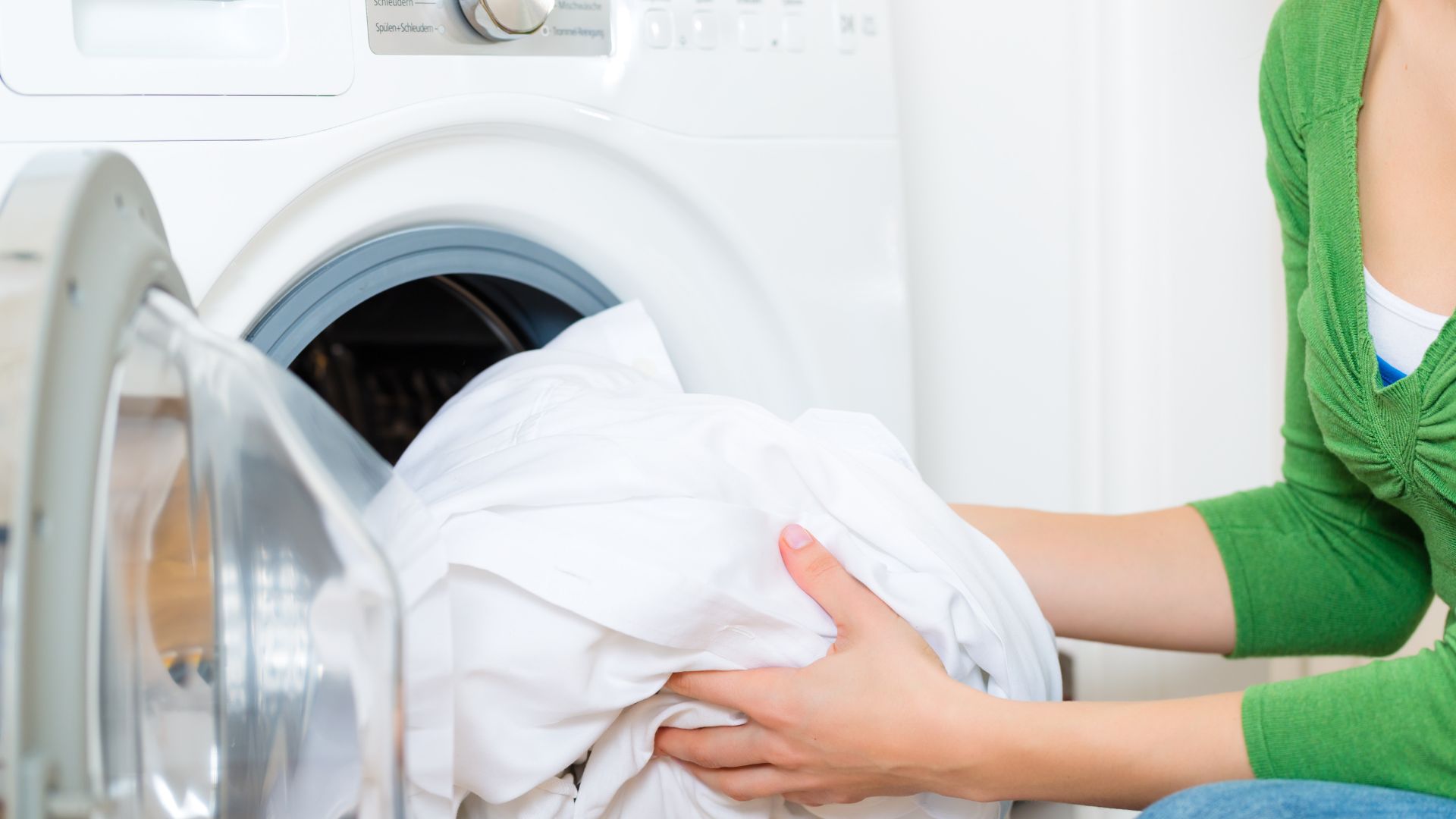
There’s nothing worse than when you once loved crisp white t-shirts, socks, and towels begin to go that dull, murky-looking grey colour. It can seem like an expensive or big task having to revive a huge batch of once-white garments, but thanks to this TikTok trick, it’s never been easier and cheaper.
Simply fill your sink with around two litres of warm to hot water and drop in two whitening denture tablets, even the cheapest ones will do. Then leave the tablets to dissolve fully within the water, and carefully submerge your greying clothes or towels into the water. Leave them in there for around 30 minutes so the tablets have time to really do their thing.
Once half an hour has passed, remove the clothes, squeeze out the excess water, and put them straight in the washing machine. When they come out, they will look good as new and as white as a set of fresh dentures.
"I was hesitant to try this hack at first because it's a risky business when cleaning whites," says Tamara. "But I can confirm that my best white t-shirts were fine in the solution (even the one with a black logo on the front) and washed up brilliantly white after treating them." Next, we might try this when cleaning our white trainers.
12. Using a microfibre mop to clean shower floors and walls
Microfibre mops aren’t just for cleaning sticky floors. Instead, they can be repurposed to make cleaning areas such as showers and hard-to-reach ceilings so much easier.
Giving showers a good clean can be difficult, with such tight spaces, it can be hard to manoeuvre yourself to be able to reach those corners, both on the floor and up on the ceiling. This is where your trusty mop can come in.
Spray the areas you're aiming to clean with either a white vinegar solution or your favourite bathroom spray, and use the mop either wet or dry to scrub. If you’re on the shorter side, it’s perfect for tall shower walls too. You can also take this hack elsewhere around the house.
With a clean and dry mop head, tackle spider webs and dust on your ceilings and when cleaning walls. It’s a good idea to have two separate mop heads so you can interchange them depending on where in the house you’re cleaning – avoid the common cleaning mistake of mopping all areas with the same head.
13. Shaving foam to prevent mirrors fogging
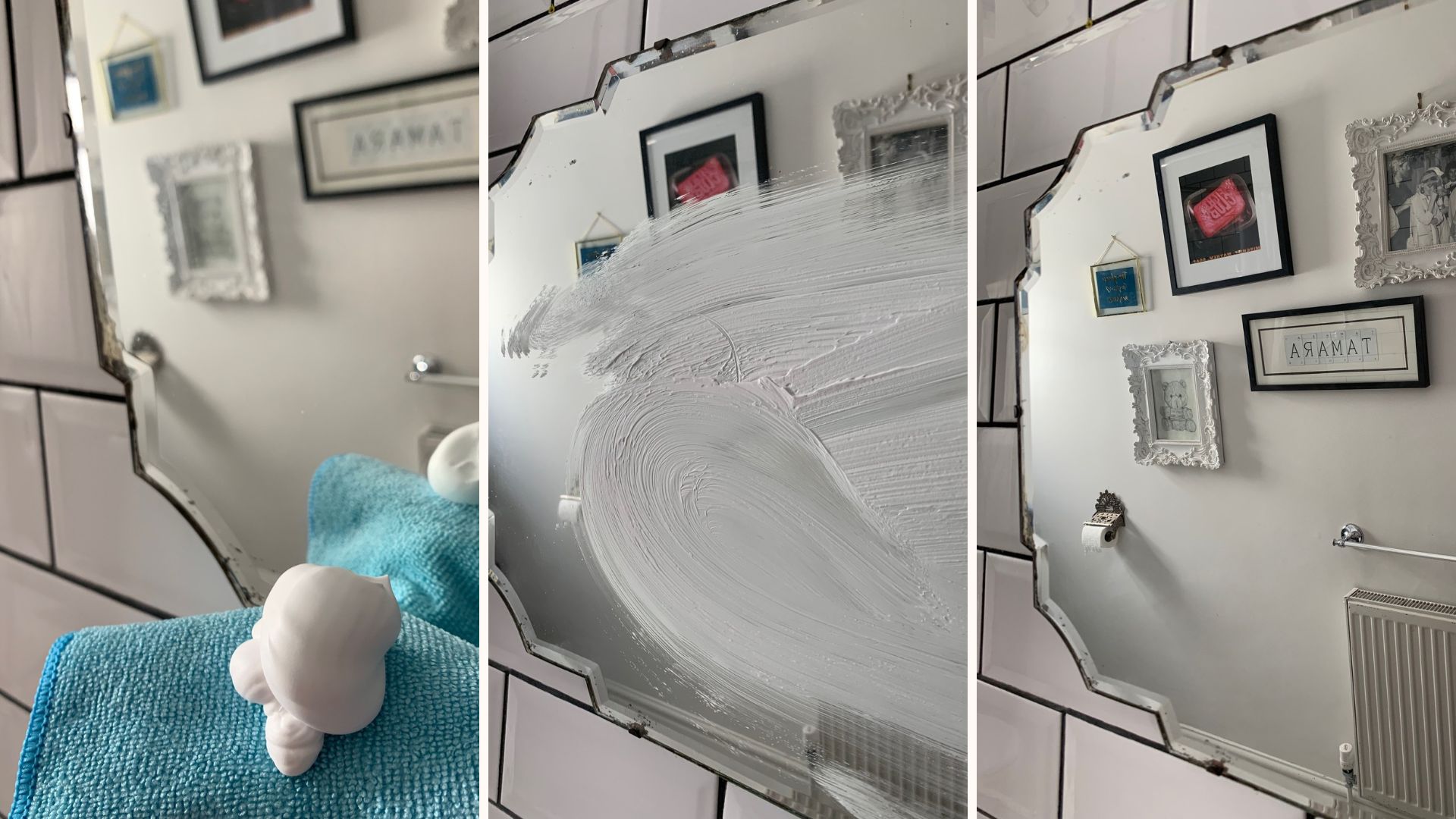
It can get annoying, stepping out of the shower to start your skincare routine only to be met with a fogged-up mirror. There's a TikTok shower hack to stop your clean mirrors from fogging up.
Start by cleaning your bathroom mirror with a simple mixture of soap and water. Once dried, cover the mirror with a small dollop of shaving foam. Take a clean microfiber cloth and begin buffing the foam into the mirror.
Once completely coated, leave it on there for around 20 minutes before wiping it off with a cloth or good-quality paper towel. The next time you shower, your mirror should have repelled any mist and steam thanks to the film the foam leaves on the glass. But don’t worry, the residue will completely go and you will be left with a streak-free sparkling mirror.
We can confirm, having tried it ourselves it does work at minimising foggy mirrors.
14. Steam cleaning a microwave with lemons
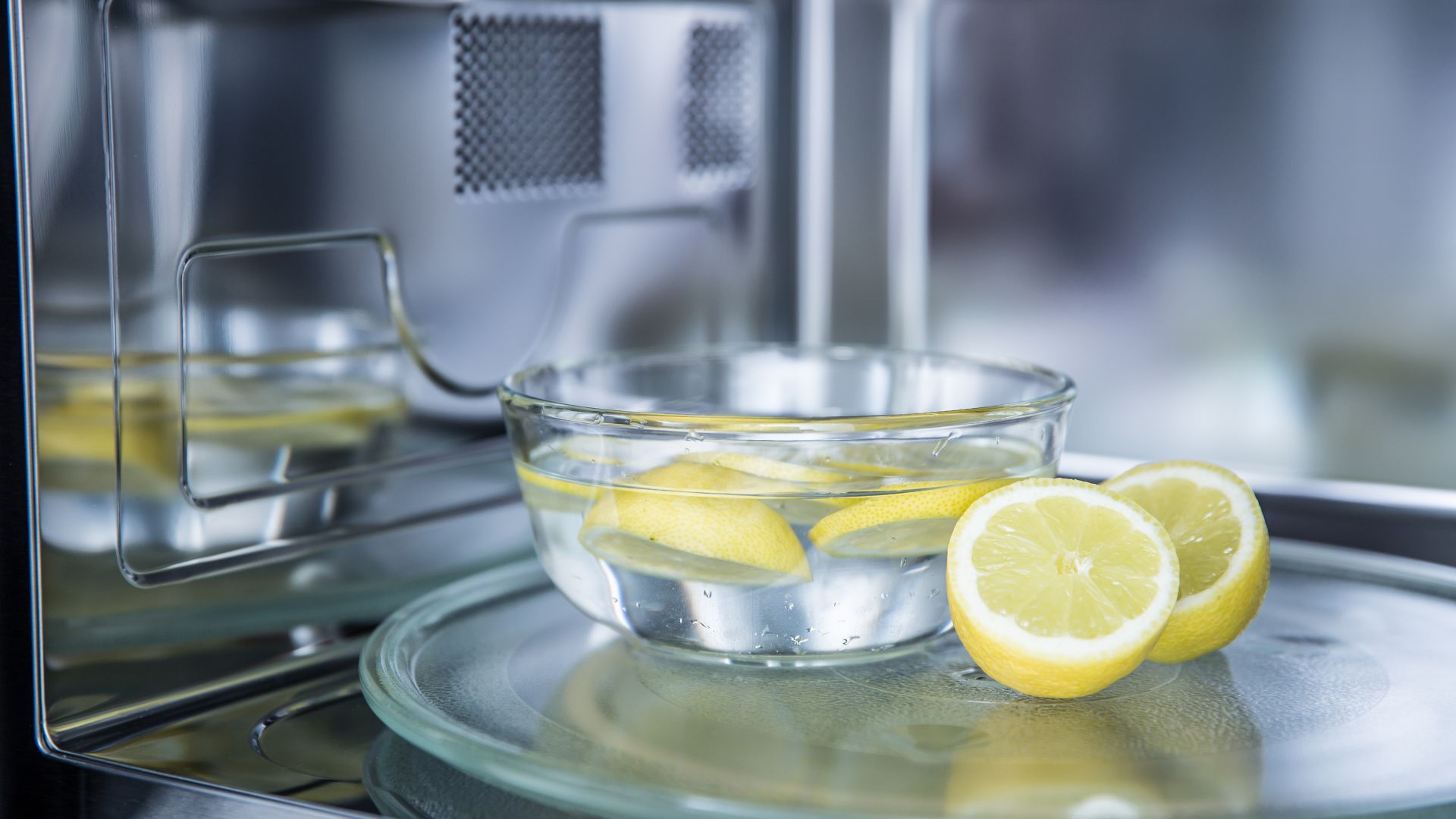
Not only does this hack help you clean your microwave, it also helps with neutralising any lingering odours from past dinners too.
First, give your microwave a quick wipe to get rid of any large bits of loose food. Then, simply fill a microwaveable bowl with water and place around ten slices of lemon into it. Place it into the microwave and start it on full for around three to five minutes until the water boils.
Don’t open the door when it’s done; instead, leave it for around five minutes so the steam made by the bowl of water can be kept contained within the microwave and do its thing.
When you open it, the steam will have worked in breaking down stubborn food stains and splatters. Take a damp cloth and wipe away all remaining stains to leave your microwave looking as good as new.
15. Cleaning up glass shards using bread
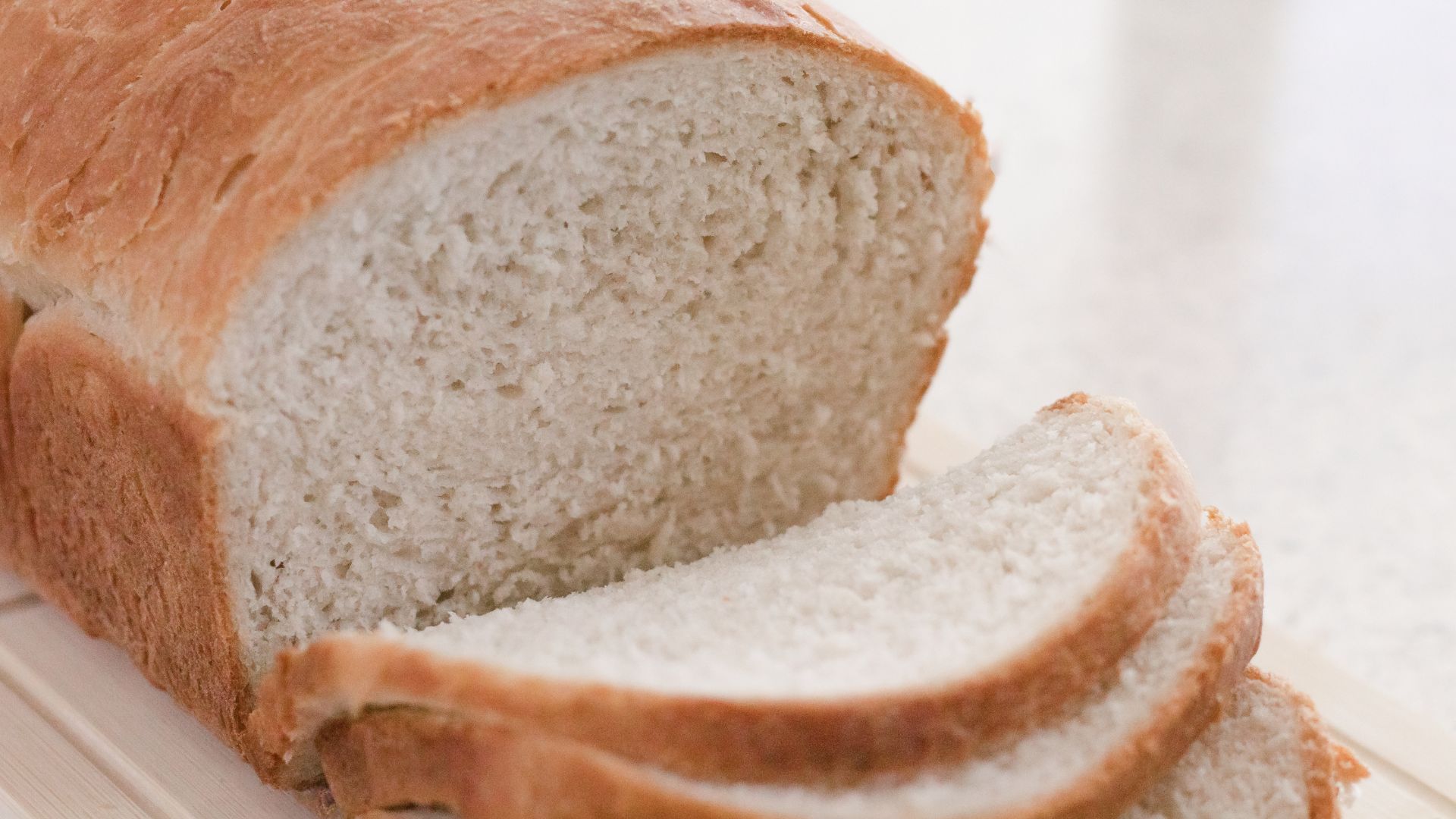
Hopefully, you won’t have to use this hack every week when cleaning the house, but it’s a useful trick to know the next time you break a glass and have to clean it up.
Schulz recommends this hack. He says, “When glass shatters, there are always tiny shards that break off which the broom or vacuum can’t get. But they can still cause harm to people and pets, so it’s essential to thoroughly clean any area around where the glass broke.”
Start by carefully sweeping up all the large pieces with a dustpan and brush. Then take a piece of white bread and pat it on the area where the glass shattered. This will lift all the micro glass particles which can’t easily be seen.
The doughy consistency of the bread acts like glue that the glass shards cling to. Just make sure you immediately throw out the slice and don’t leave it hanging around for any unsuspecting pets or children.
16. Use toothpaste to leave bathroom fixtures sparkling
Even if you've avoided the curse of buying black taps, trust us, they're a nightmare to clean; chrome fixtures can be just as tricky to keep mark-free. But did you know that the solution to sparkling taps is hiding in your bathroom?
"Toothpaste (yes, really) isn’t just for your teeth - it’s actually brilliant at cutting through limescale and grime, especially on chrome fixtures like taps, showerheads, and handles," explains Olivia Young, Cleaning expert and Product Development Scientist at Astonish.
"Just squeeze a small amount onto a damp cloth, buff it into the area, then rinse away with warm water. You’ll be left with shiny, streak-free taps and a lovely minty scent too - no harsh chemicals required. It also works a treat on water marks around sinks and bath edges, making your bathroom feel fresh and gleaming with minimal effort – it’s a real multitasker," she instructs.
17. Use socks to dust your blinds
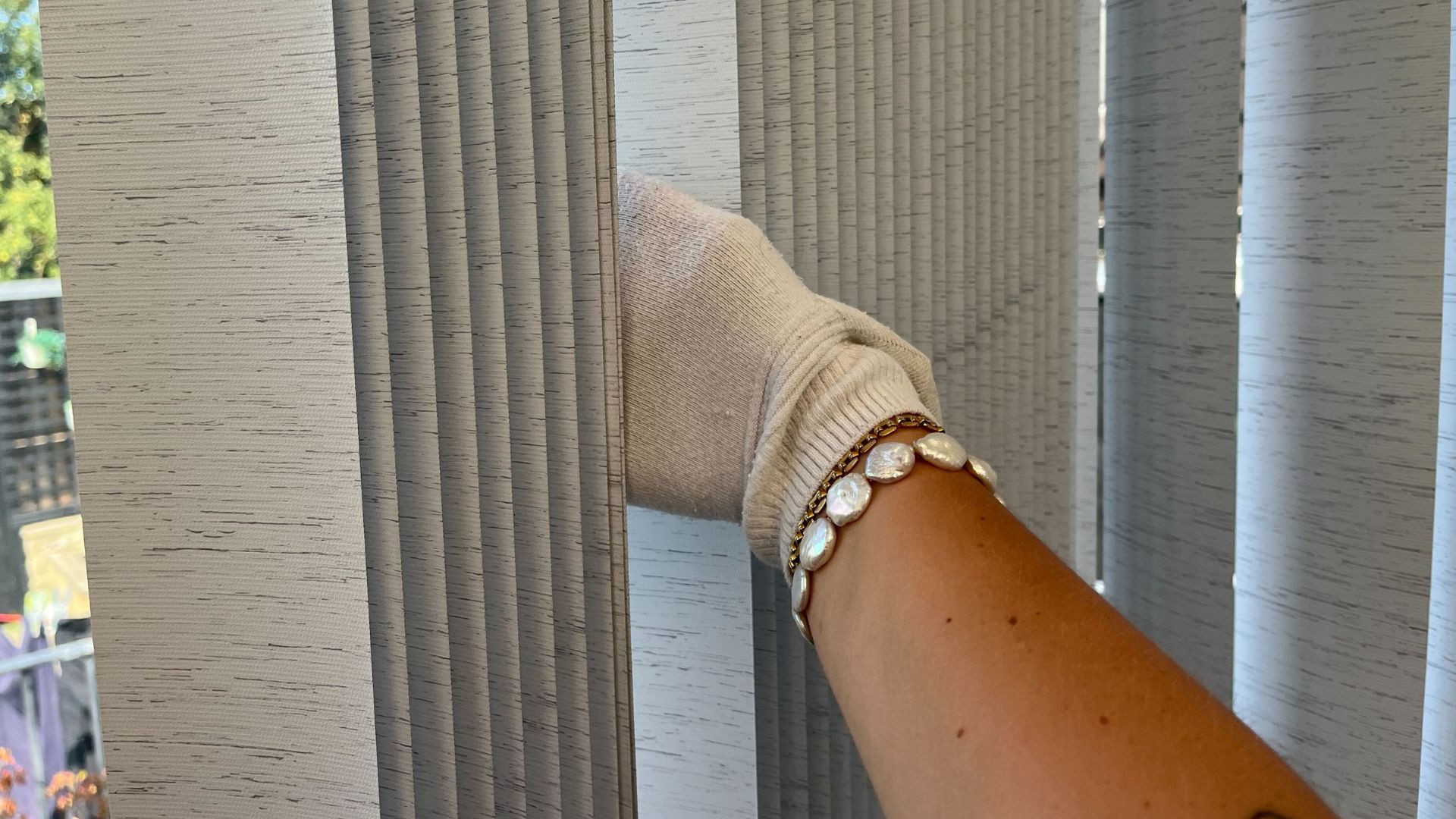
If you have blinds, you'll know they're practically magnets for dust and cleaning your blinds is probably something you tend to put off. However, this easy, rather funny hack can make quick work of the dust build-up.
"Pop an old sock on your hand, spritz it lightly with cleaner or even just water, and run your fingers along each panel to trap and lift dust with ease. It’s oddly satisfying, and yes, it really does work!," suggests Olivia.
Who knew sock puppets would be the answer to dust-free blinds?
The viral cleaning hacks to avoid
Our team of experts also pointed out that some of the cleaning advice online from inexperienced 'cleaners' can leave you disappointed or even in some cases, can be quite dangerous.
Here are some of the hacks and tricks to avoid when starting on your next clean.
1. Mixing chemical cleaning products
Although many combinations are completely safe and great to use around your home, certain chemicals shouldn't be put together. Lynsey Crombie warns that "Although it may look pretty, mixing cleaning products down the toilet is dangerous as you are mixing strong chemicals."
A recent TikTok trend, named the 'Overloading' trend, saw users making potion-like concoctions of cleaning products all within their toilet bowls.
The trend involved filling a toilet bowl with multiple colourful cleaning products, which leads to certain rainbow effects as well as bubbles. Although perhaps nice to look at, the mixture of chemicals can release toxic gases and become very dangerous in badly ventilated areas. Especially, stay clear of mixing bleach with any type of vinegar, as it can create particularly dangerous chlorine gas.
It's best to keep it simple and stick to just one toilet cleaning product at a time, as well as always check the ingredients of the products you're using.
2. Using soda to clean your toilet bowl
You may have seen the videos of people pouring cola into their toilet bowls and labelling it a cleaning hack. Luckily, this won't pose any dangers other than perhaps some disappointing results.
A soft drink is not nearly as potent or effective as a conventional cleaning product, such as bleach or branded toilet cleaner. So it's best to avoid spending extra money on soda to only pour it down the drain. Instead, drink the soda and leave the toilet cleaning products to the professionals.
3. Lemons in your dishwasher
Unlike its effectiveness in our microwaves, using lemons in the hopes of it both cleaning and deodorizing your dishwasher won't achieve the same results.
Unfortunately, due to the sheer amount of water that goes through your machine even adding several lemon slices won't make much of a difference.
Instead, stick to using our white vinegar hack or perhaps some of these useful steps to clean your dishwasher easily and quickly.
4. Using power tools to do your cleaning
It may seem like using a power drill to clean and scrub your shower, as seen on TikTok, for you is a great way of cutting down on the elbow grease needed. However, fixing a scrubbing brush to your drill can actually damage surfaces, scratch tiles, and lift grout.
When looking for cleaning tools it's always best to stick to products that are specifically marketed for the use of cleaning. Otherwise, you may end up with some permanent damage that no amount of scrubbing can fix.
5. Applying undiluted essential oils to fabrics
We all want a house that smells amazing, but some essential oils can not only be damaging to certain materials but also major irritants for our skin. Whether you've seen a hack for scenting your mattress or even adding essential oil to the inside of your toilet rolls, we advise staying clear.
Essential oils are very potent, with some even being poisonous to pets. So applying them undiluted to fabrics and other soft absorbent materials can cause more harm than good. It's always best to dilute the oils, check which scents are appropriate for the potential pets in your house, and leave your toilet rolls as they are.
6. Cleaning an oven with dishwasher tablets
TikTok 'Cleanfluencers' have begun using dishwashing tablets to tackle the messiest and arguably one of the toughest cleaning jobs in the kitchen: cleaning the inside of the oven.
We wouldn't recommend this method as the results were not particularly effective, not even comparable to cleaning with some soapy water and a microfibre cloth. That's not to mention there can be some skin-irritating chemicals within the tablets and depending on the brand you're using, it’ll be easier to hold the tablet with the flat side facing down towards the surface you're cleaning. In conclusion, it's too much effort for not a great gain.
7. A tennis ball to remove scuff marks on floors
This one may seem a little wacky, but there was word that it works like magic for rubber scuffs on tile or wood flooring.
The advice is to simply get a fresh tennis ball and rub it over the scuff mark. It's claimed that the tennis ball’s friction works against the rubber mark and lifts it off the wood or tile. We really wanted this to work to tackle those annoying black scuffs and sneaker marks, but alas, it didn't deliver.
Despite giving a tennis ball a good rub on a wooden floor with scuffs, the marks remained. It's far more beneficial to get on your hands and knees and gently scrub the stain with a splash of vinegar on a microfibre cloth.
If you want to stock up on more expert cleaning advice, how about these efficient spring cleaning tips that will help you deep clean your home in record time?







